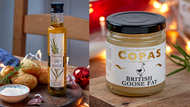Goose Fat vs Roasting Oil: The Ultimate Roast Potato Showdown
Posted by Copas Farm Shop on 7th Aug 2025
When it comes to the perfect roast potato, we Brits don’t mess about. Golden, crispy on the outside, fluffy on the inside, it’s the kind of comfort food that can make even the gloomiest Sunday feel special. But one debate continues to divide households and dinner tables alike: goose fat or roasting oil?
Let’s dive into the pros and cons of each, so next time you're prepping your roasties, you’ll know exactly which side you're on.
The Case for Goose Fat
Goose fat is a traditional favourite, particularly around Christmas. It’s the stuff of legend when it comes to roasties, and there’s good reason for that.
Pros:
• Incredible crispiness: Goose fat has a high smoke point and a rich composition of fats that create that deeply golden, crunchy exterior we all love.
• Rich, savoury flavour: There’s an unmistakable depth to goose fat. It gives your roasties that classic, slightly gamey note – indulgent, luxurious, and oh-so-satisfying.
• Perfect for special occasions: If you’re going all out for a Sunday roast or festive feast, goose fat brings a sense of occasion.
Things to bear in mind:
• Not vegetarian/vegan-friendly: An obvious one, but worth stating.
• Less readily available: It can be a touch pricier and may not always be in stock at your local shop (though many supermarkets now carry it, especially in winter).
• Higher in saturated fat: Fine in moderation, but perhaps not your go-to for everyday use.
The Case for Roasting Oil
Roasting oil has become a staple in most British kitchens. While traditionally more associated with Mediterranean cooking, it’s made its way into the world of roast potatoes, and with some tasty results.
Pros:
• Healthier option: Especially if you use extra virgin roasting oil, you’re getting heart-healthy monounsaturated fats and antioxidants.
• Lighter flavour: If you prefer your potatoes to let the seasoning and herbs do the talking, roasting oil offers a more neutral base (especially lighter varieties).
• More accessible and versatile: You probably already have a bottle or two in your cupboard.
Things to consider:
• Slightly less crispy: Roasting oil doesn’t quite reach the same crunch level as goose fat, though you can still get lovely results with the right method (hot tray, parboil, shake, etc.).
• Flavour can vary: Stronger roasting oils may overpower the dish, so opt for a mild or light version if you're after balance.
So, which should you choose?
Honestly - it depends on the occasion.
• For Christmas, Sunday roasts, or when you want the ultimate crunch and richness: Goose fat wins hands down.
• For a midweek dinner, a lighter feel, or when cooking for guests with dietary requirements: Roasting oil is your go-to.
You can even get creative – some home cooks swear by mixing the two for the best of both worlds. And of course, seasoning is key. Don’t forget the sea salt, a sprinkle of rosemary or thyme, and perhaps a hint of garlic for that extra bit of magic.
Whether you’re team goose fat or loyal to roasting oil, the most important ingredient is love (yes, we said it). Take the time to parboil your spuds, rough them up, heat your fat before tossing them in, and roast until they're gloriously golden.
After all, a roast potato isn’t just a side dish, it’s a statement.
If you're aiming for something genuinely special, our own Copas British Goose Fat is a gem, sourced from traditionally raised British geese, it’s treasured for making "the ultimate roast potatoes a doddle". Meanwhile, our Copas Roasting Oil for Potatoes is a cold‑pressed blend of rosemary and garlic rapeseed oil that elevates roasties with a fragrant, herb‑infused crisp, and enhances the flavour of potatoes. Both are crafted with care and tradition in mind, offering either indulgent richness or aromatic elegance depending on your roastie mood.

